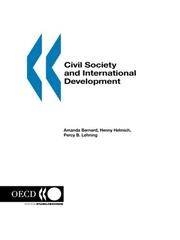| Listing 1 - 10 of 10 |
Sort by
|
Book
ISBN: 9080150592 Year: 1998 Publisher: Utrecht Studie- en informatiecentrum mensenrechten
Abstract | Keywords | Export | Availability | Bookmark
 Loading...
Loading...Choose an application
- Reference Manager
- EndNote
- RefWorks (Direct export to RefWorks)
Economic assistance --- Human rights --- Law and economic development --- Economic development and law --- Law and development --- Economic development --- Developing countries --- Economic conditions. --- Law and economic development.
Book
ISBN: 926403899X 9789264038998 Year: 1994 Publisher: Paris OCDE
Abstract | Keywords | Export | Availability | Bookmark
 Loading...
Loading...Choose an application
- Reference Manager
- EndNote
- RefWorks (Direct export to RefWorks)
Development aid. Development cooperation --- Economic assistance --- Economic development --- Non-governmental organizations --- Technical assistance --- 334.7 --- INGOs (International agencies) --- International non-governmental organizations --- NGOs (International agencies) --- Nongovernmental organizations --- Organizations, Non-governmental (International agencies) --- Private and voluntary organizations (International agencies) --- PVOs (International agencies) --- International agencies --- Nonprofit organizations --- Development, Economic --- Economic growth --- Growth, Economic --- Economic policy --- Economics --- Statics and dynamics (Social sciences) --- Development economics --- Resource curse --- 334.7 Diverse economische organisatievormen. Particuliere ondernemingen. Semioverheidsbedrijven. Openbare bedrijven. Overheidsbedrijven. Staatsbedrijven. Multinationals. Grootbedrijf. Middenbedrijf. Kleinbedrijf --- Diverse economische organisatievormen. Particuliere ondernemingen. Semioverheidsbedrijven. Openbare bedrijven. Overheidsbedrijven. Staatsbedrijven. Multinationals. Grootbedrijf. Middenbedrijf. Kleinbedrijf --- Economic assistance - Developing countries --- Technical assistance - Developing countries
Book
Abstract | Keywords | Export | Availability | Bookmark
 Loading...
Loading...Choose an application
- Reference Manager
- EndNote
- RefWorks (Direct export to RefWorks)
Digital
ISBN: 9789264163393 9789264161177 Year: 1998 Publisher: Paris OECD
Abstract | Keywords | Export | Availability | Bookmark
 Loading...
Loading...Choose an application
- Reference Manager
- EndNote
- RefWorks (Direct export to RefWorks)
Interest in the concept of civil society has undergone a remarkable renaissance in the 1990s. It is currrently seen as a potential tool to overcome some of the main theoretical and political stalemates. But what exactly does the concept of civil society mean ? Can civil society really be a counterweight to governments which have become too remote from their people ? The Western concept of what constitutes civil society may well have to be adjusted when applied to developing economies where different cultural forces and values come into play. This book takes up the challenge of defining civil society's role in furthering developmental objectives within the context of developing societies themselves. It compares the activities and attitudes of different elements of civil society within the development process, and suggests ways in which they could be made more effective. It also shows that governments should not try to replace their own development activities with those of civil society.

ISBN: 1853835897 Year: 1999 Publisher: London Earthscan
Abstract | Keywords | Export | Availability | Bookmark
 Loading...
Loading...Choose an application
- Reference Manager
- EndNote
- RefWorks (Direct export to RefWorks)

ISBN: 9264161953 9789264163850 9789264161955 Year: 1998 Publisher: Paris OECD
Abstract | Keywords | Export | Availability | Bookmark
 Loading...
Loading...Choose an application
- Reference Manager
- EndNote
- RefWorks (Direct export to RefWorks)
This collection of studies of public attitudes to development co-operation in OECD Development Assistance Committee (DAC) Member countries demonstrates that the concept of "aid fatigue" is misplaced. A serious lack of adequate knowledge about development co-operation, however, is also revealed. The opinions of policy makers are, therefore, overwhelmingly important and development education efforts should be specifically addressed to them. The book also demonstrates that the role of NGOs is important in general development education. Not only do these organisations mobilise their members in the development field, but their activities create a fund of information within their societies. Remarkable progress by both governments and NGOs has been made during the 1990s in improving co-operation domestically and in operational development activities in the field. Most DAC Member countries have significantly increased the involvement of NGOs in their development efforts, and most NGOs have become increasingly effective in their work. The editors conclude that NGOs and governments both need to work towards more and better public and political-level understanding of development efforts. This will require a wide range of complementary activities, some of which are best undertaken by NGOs, and others by government agencies.

ISBN: 9264161171 9786610030354 1280030356 9264163395 Year: 1998 Publisher: Paris, France : North-South Centre of the Council of Europe : Development Centre of the Organisation for Economic Co-operation and Development,
Abstract | Keywords | Export | Availability | Bookmark
 Loading...
Loading...Choose an application
- Reference Manager
- EndNote
- RefWorks (Direct export to RefWorks)
Civil society --- Democratization --- Economic development --- International cooperation --- International economic integration --- Internationalism --- Liberalism --- Congresses. --- Société civile --- Coopération internationale --- Développement économique --- Congresses --- Congrès


ISBN: 9264161953 9789264163850 9789264161955 9264163859 Year: 1998 Publisher: Paris : OECD Publishing,
Abstract | Keywords | Export | Availability | Bookmark
 Loading...
Loading...Choose an application
- Reference Manager
- EndNote
- RefWorks (Direct export to RefWorks)
This collection of studies of public attitudes to development co-operation in OECD Development Assistance Committee (DAC) Member countries demonstrates that the concept of "aid fatigue" is misplaced. A serious lack of adequate knowledge about development co-operation, however, is also revealed. The opinions of policy makers are, therefore, overwhelmingly important and development education efforts should be specifically addressed to them. The book also demonstrates that the role of NGOs is important in general development education. Not only do these organisations mobilise their members in the development field, but their activities create a fund of information within their societies. Remarkable progress by both governments and NGOs has been made during the 1990s in improving co-operation domestically and in operational development activities in the field. Most DAC Member countries have significantly increased the involvement of NGOs in their development efforts, and most NGOs have become increasingly effective in their work. The editors conclude that NGOs and governments both need to work towards more and better public and political-level understanding of development efforts. This will require a wide range of complementary activities, some of which are best undertaken by NGOs, and others by government agencies.
Development aid. Development cooperation --- Sociology of culture --- Economic assistance, Canadian --- International cooperation --- 339.96 --- Cooperation, International --- Global governance --- Institutions, International --- Interdependence of nations --- International institutions --- World order --- Cooperation --- International relations --- International organization --- Canadian economic assistance --- 339.96 Ontwikkelingshulp. Ontwikkelingssamenwerking. Ontwikkelingsproblematiek --- Ontwikkelingshulp. Ontwikkelingssamenwerking. Ontwikkelingsproblematiek --- Public opinion --- Public opinion. --- Economic assistance --- Coopération internationale --- Aide économique --- Opinion publique --- Development --- Economic History --- Business & Economics --- Economic development --- Development, Economic --- Economic growth --- Growth, Economic --- Economic policy --- Economics --- Statics and dynamics (Social sciences) --- Development economics --- Resource curse

ISBN: 1280030356 9786610030354 9264163395 9264161171 Year: 1998 Publisher: Paris : OECD Publishing,
Abstract | Keywords | Export | Availability | Bookmark
 Loading...
Loading...Choose an application
- Reference Manager
- EndNote
- RefWorks (Direct export to RefWorks)
Interest in the concept of civil society has undergone a remarkable renaissance in the 1990s. It is currrently seen as a potential tool to overcome some of the main theoretical and political stalemates. But what exactly does the concept of civil society mean ? Can civil society really be a counterweight to governments which have become too remote from their people ? The Western concept of what constitutes civil society may well have to be adjusted when applied to developing economies where different cultural forces and values come into play. This book takes up the challenge of defining civil society's role in furthering developmental objectives within the context of developing societies themselves. It compares the activities and attitudes of different elements of civil society within the development process, and suggests ways in which they could be made more effective. It also shows that governments should not try to replace their own development activities with those of civil society.
Development --- Civil society --- Economic development --- International cooperation --- Internationalism --- International economic integration --- Democratization --- Liberalism --- Political Science --- Law, Politics & Government --- Political Theory of the State --- Congresses --- Société civile --- Coopération internationale --- Développement économique --- Congrès
Digital

ISBN: 9789264163850 Year: 1998 Publisher: Paris Lisboa Organization for Economic Cooperation and Development. Development Centre North-South Centre of the Council of Europe
Abstract | Keywords | Export | Availability | Bookmark
 Loading...
Loading...Choose an application
- Reference Manager
- EndNote
- RefWorks (Direct export to RefWorks)
This collection of studies of public attitudes to development co-operation in OECD Development Assistance Committee (DAC) Member countries demonstrates that the concept of "aid fatigue" is misplaced. A serious lack of adequate knowledge about development co-operation, however, is also revealed. The opinions of policy makers are, therefore, overwhelmingly important and development education efforts should be specifically addressed to them. The book also demonstrates that the role of NGOs is important in general development education. Not only do these organisations mobilise their members in the development field, but their activities create a fund of information within their societies. Remarkable progress by both governments and NGOs has been made during the 1990s in improving co-operation domestically and in operational development activities in the field. Most DAC Member countries have significantly increased the involvement of NGOs in their development efforts, and most NGOs have become increasingly effective in their work. The editors conclude that NGOs and governments both need to work towards more and better public and political-level understanding of development efforts. This will require a wide range of complementary activities, some of which are best undertaken by NGOs, and others by government agencies.
| Listing 1 - 10 of 10 |
Sort by
|

 Search
Search Feedback
Feedback About UniCat
About UniCat  Help
Help News
News